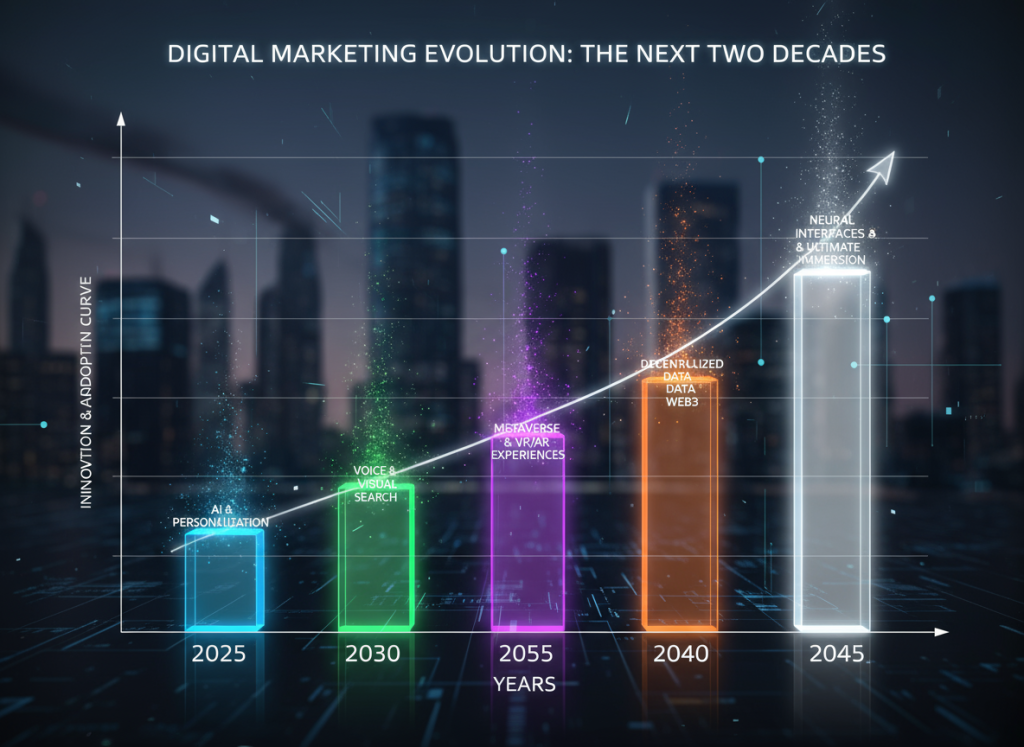The Future of Digital marketing: Trends, Technologies, and Transformations:-Digital marketing is evolving at lightning speed due to rapid technological progress, changing consumer behavior, and new regulations. The next decade will redefine how brands communicate, connect, and convert. Below is a detailed exploration of the future of digital marketing, structured across key areas that will shape this dynamic industry.
The Future Of Digital Marketing is Very Bright.

1. Artificial Intelligence (AI) and Machine Learning (ML) Dominance
- AI-powered personalization
- AI enables marketers to analyze large datasets and predict user behavior.
- Hyper-personalized experiences—like dynamic content, predictive recommendations, and customized ads—will become standard.
- Platforms like ChatGPT, Google Gemini, and Meta’s AI tools will automate customer interactions and content creation. Future of Digital marketing
- Smart automation in campaigns
- AI-driven automation tools will manage bidding strategies, email sequencing, and customer segmentation.
- Predictive analytics will help forecast trends and consumer needs before they emerge.
- Conversational AI and chatbots
- Future chatbots will be indistinguishable from humans, offering 24/7 intelligent customer support.
- Integration with voice assistants like Alexa or Google Assistant will expand conversational marketing.
2. Voice and Visual Search Optimization
- Voice search dominance
- Over 60% of internet users will use voice search by 2030.
- Brands must optimize for conversational queries and natural language keywords.
- Local SEO will benefit since voice searches are often location-based (“near me” queries).
- Visual search technology
- Tools like Google Lens and Pinterest Lens will change search behavior.
- Users can upload images instead of typing queries.
- Businesses will need to optimize product images and metadata for visual discoverability.
3. Rise of Immersive Experiences: AR, VR, and the Metaverse
- Augmented Reality (AR) marketing
- AR will allow consumers to “try before they buy” — like virtually trying on clothes or previewing furniture in their home.
- AR ads will become interactive, blending digital with physical experiences.
- Virtual Reality (VR) branding
- Companies will create immersive virtual stores and events.
- Travel and real estate industries are already using VR for virtual tours.
- The Metaverse as a marketing frontier
- Virtual worlds like Meta’s Horizon, Roblox, and Fortnite will become platforms for brand engagement.
- NFTs and virtual merchandise will open new revenue streams.
- Influencer marketing will extend into virtual avatars and holograms.
4. Content Evolution: From Static to Interactive
- Interactive content engagement
- Polls, quizzes, calculators, and 360° videos increase engagement time and data collection.
- Future content strategies will focus on active participation, not passive consumption.
- Short-form video dominance
- TikTok, YouTube Shorts, and Instagram Reels have reshaped attention spans.
- Brands will need to tell compelling stories within seconds.
- User-generated content (UGC)
- Consumers trust peers more than ads.
- Encouraging customers to share reviews, unboxings, or testimonials will strengthen authenticity.
- AI-generated content
- AI tools will handle blog writing, ad copy, and product descriptions.
- However, authenticity and originality will remain critical to avoid AI fatigue.

5. Data Privacy, Ethics, and Transparency
- End of third-party cookies
- With stricter privacy laws (GDPR, CCPA), brands must rely on first-party data.
- Consent-based marketing will be the new norm.
- Ethical data use
- Transparency in how brands collect, store, and use data will build consumer trust.
- Ethical AI will prevent manipulation and bias in ad targeting.
- Blockchain for trust and verification
- Blockchain will validate ad impressions, prevent fraud, and track campaign authenticity.
- It will also ensure secure data exchanges between consumers and brands.
6. Hyper-Personalization and Predictive Marketing
- Predictive customer behavior analysis
- Machine learning will identify patterns and predict what customers need next.
- Campaigns will shift from reactive to proactive marketing.
- Micro-segmentation
- Instead of broad demographics, future targeting will consider psychographics, habits, and emotions.
- Example: Netflix’s ultra-personalized recommendations powered by behavioral analytics.
- Emotionally intelligent marketing
- AI tools will analyze tone, facial expressions, and sentiment to tailor responses in real-time.
7. Social Media 3.0: Decentralized, Niche, and Commerce-Driven
- Decentralized social platforms
- Future networks will give users more control over data and content ownership (e.g., Lens Protocol, Mastodon).
- Rise of social commerce
- Direct in-app purchases on Instagram, TikTok Shop, and YouTube Shopping will merge content with commerce.
- Influencers will act as virtual sales agents.
- Niche communities and micro-influencers
- Smaller, engaged audiences will be more valuable than large, generic followings.
- Authenticity and trust will outweigh popularity.
8. Omnichannel and Cross-Device Integration
- Seamless customer journey
- Integration across mobile, web, voice, wearable, and IoT devices will be essential.
- Marketers will use unified analytics dashboards to track behavior across all touchpoints.
- Connected devices and IoT marketing
- Smart fridges, cars, and watches will deliver personalized recommendations.
- Example: A smartwatch suggesting hydration drinks after a workout.
- Integrated brand storytelling
- Brands must maintain consistent voice, tone, and visuals across platforms.
- Storytelling will focus on emotional connection rather than product promotion.
9. Sustainability and Purpose-Driven Marketing
- Eco-conscious branding
- Consumers prefer sustainable and ethical brands.
- Digital campaigns will highlight environmental responsibility and transparency.
- Social responsibility storytelling
- Future marketing will focus on brand values—diversity, inclusivity, and social impact.
- Greenwashing (false eco-claims) will face public backlash.
- Minimalist and mindful advertising
- The Future of Digital Marketing Less intrusive ads with meaningful messages will replace excessive promotions.
10. Video Marketing and Live Streaming Boom
- Live shopping and streaming
- Influencers hosting live sales events will boost instant conversions.
- Real-time engagement increases authenticity.
- AI video editing and personalization
- Tools like Synthesia and Runway will automate video creation with realistic avatars.
- Dynamic video ads will adapt content to individual viewers.
- 360° and shoppable videos
- Interactive elements will let viewers click and buy products directly from videos.
11. Analytics and ROI Measurement
- Predictive and prescriptive analytics
- Beyond “what happened,” analytics will reveal “what will happen” and “what should be done.”
- Real-time dashboards will track KPIs across campaigns.
- Attribution modeling
- Advanced models will identify which channels drive the most value in complex customer journeys.
- AI-driven insights
- Machine learning will automatically suggest optimization actions—like reallocating ad spend or adjusting timing.
12. The Role of Influencers and Digital Creators
- Virtual influencers
- AI-generated personas (like Lil Miquela) will collaborate with brands.
- They offer consistent behavior and zero scandals.
- Authenticity over celebrity
- Micro- and nano-influencers will dominate due to stronger community trust.
- Creator economy platforms
- Subscription-based communities (Patreon, Substack, etc.) will reshape content monetization.
13. Future Skills for Digital Marketers
- Data literacy and analytics
- Understanding AI tools, data interpretation, and ROI measurement will be critical.
- Creative storytelling and emotional design
- Despite automation, creativity remains irreplaceable.
- Tech-savviness
- The Future of Digital Marketing Familiarity with AR, VR, blockchain, and automation tools will be expected.
- Ethical and empathetic marketing
- Marketers must balance personalization with privacy and respect.
14. Conclusion: The Next Decade of Digital Marketing
- The future of digital marketing lies in human-centered technology — blending automation with empathy.
- AI, AR/VR, voice, and data ethics will define the next marketing era.
- Brands that adapt early, invest in personalization, and stay transparent will dominate.
- Ultimately, digital marketing will evolve from selling products to creating connected, meaningful experiences that enrich consumers’ lives.

LSI [ Latent Semantic Indexing ]
1. Virtual Reality (VR) Marketing
Virtual Reality (VR)marketing takes users to a completely new digital world. It uses headsets or special apps to let people explore virtual environments. In the future, VR will become a big part of digital marketing because it can give customers a full experience, not just information.
Imagine visiting a car showroom or a travel destination without leaving your home—that’s what VR can do. Brands can create virtual stores, tours, and events where customers interact with products and learn more in an engaging way. For example, real estate companies can show virtual tours of houses ,Virtual Reality Marketing and tourism brands can give virtual travel experiences.
VR marketing builds strong emotional connections because people feel like they are “inside” the experience. This can increase trust and interest in the brand.
As VR devices become more affordable, more businesses will use them for advertising, training, and brand storytelling. In short, VR marketing is the future of immersive, experience-based advertising.
Latest Trends in Future of digital marketing 2025
2. Social Media Marketing
Social media is already a huge part of digital marketing, and in the future, it will become even more powerful. Platforms like Instagram, TikTok, YouTube, and Facebook will continue to shape how brands connect with customers.
In the coming years, short videos, live streams, and influencer collaborations will become the most effective tools for engagement. Social media platforms will also focus more on social commerce, where users can directly buy products from posts or videos without leaving the app.
The Future Of Digital Marketing is Changing rapidly due to new technologies . Social Media Marketing Personalization will play a big role. Algorithms will show each user the kind of content they like the most. Artificial Intelligence will also help schedule posts, analyze results, and suggest improvements.
Future social media marketing will be more about authenticity and community rather than just promotions. Brands that share real stories and interact genuinely with followers will succeed.
In short, social media will remain the best place for businesses to reach, attract, and build long-term relationships with their audience.
3. Content Personalization
Content personalization means creating content that matches each customer’s interests, habits, and needs. In the future, it will become the key to successful digital marketing. People don’t like general ads—they want to see content that speaks directly to them.
Content Personalization With the help of AI and data analysis, marketers can understand what each person likes, what they search for, and what products they want. For example, Netflix shows different movie recommendations to different users, depending on their viewing habits.
The Future Of Digital Marketing infographic showing AL trends .Personalized emails, product suggestions, and ads will make customers feel special and understood. It will also increase trust and loyalty.
However ,Content personalization must be balanced with privacy. Brands should collect data ethically and be transparent with customers.
The Future Of Digital marketing In the future, content personalization will help brands connect emotionally with people, leading to more satisfaction and stronger customer relationships. It’s not just about selling—it’s about making customers feel valued.
4. Video Marketing
Video marketing is one of the most effective ways to reach audiences, and it will grow even more in the future. People love watching videos because they are simple, engaging, and easy to understand. Platforms like YouTube, TikTok, and Instagram Reels have made short videos extremely popular.
video marketing In the future, businesses will use short videos, live videos, and interactive videos to promote products and build trust. Videos help explain complex ideas quickly and make emotional connections with viewers.
Live streaming will also become a strong marketing tool, allowing brands to connect with audiences in real time. For example, live product demos or Q&A sessions create instant engagement.
Future Of Digital Marketing .AI tools will help create and edit videos faster, making production easier for small businesses.
Overall, video marketing will remain one of the most powerful and entertaining ways to attract attention, tell stories, and convert viewers into customers.
5. Data Privacy and Security
As digital marketing grows, protecting customer data will become more important than ever. People today are more aware of how their information is used online. Governments around the world have introduced data protection laws like GDPR in Europe.
The future Of Digital marketing Data Privacy and Security In the future, companies will collect less personal data and focus on first-party data, meaning information shared directly by customers. Transparency will be key—brands must clearly tell users what data they collect and why.
The Future of Digital Marketing personalization will play a major role.Marketers who respect privacy and use data ethically will gain customer trust. On the other hand, companies that misuse information will lose credibility.
Data security will also involve using advanced technologies like blockchain to prevent fraud and secure transactions.
Data privacy and Security In simple words, the future of digital marketing will balance smart targeting with privacy protection. Customers will prefer brands that are honest, safe, and transparent about how they use data.
6. Influencer Marketing
Influencer marketing means promoting products through people who have strong social media followings. In the future, it will continue to grow, but in new ways.
Instead of only focusing on big celebrities, brands will collaborate more with micro-influencers—people who have smaller but loyal and engaged audiences. Their followers trust their opinions, making their recommendations powerful.
Influencer marketing will also expand into new platforms like TikTok, LinkedIn, and the Metaverse. Virtual influencers—computer-generated characters—will also promote brands.
The Future of Digital Marketing In the future, companies will focus on long-term partnerships rather than one-time deals. Authentic storytelling and genuine reviews will matter more than scripted promotions.
AI tools will help find the best influencers for specific target audiences.
Overall, influencer marketing will remain one of the most human and relatable forms of advertising because it connects real people with real experiences and builds trust.
7. Metaverse Marketing
The Metaverse is a digital world where people can work, play, and shop using avatars. It combines Augmented Reality (AR), Virtual Reality (VR), and 3D technology. In the future, marketing in the Metaverse will open new doors for brands.
Companies can create virtual stores, fashion shows, and events that people can join from anywhere. Customers will be able to see and experience products in 3D before buying them.
Brands will also sell digital goods, like virtual clothes or accessories for avatars. This will create a new kind of economy.
Metaverse marketing will focus on experiences rather than traditional ads. People will explore, interact, and have fun while learning about products.The Future Of Digital Marketing .
It will also be a great space for influencer collaborations and virtual campaigns.
In short, the Metaverse will make marketing more creative, social, and immersive, giving people a whole new way to connect with brands.
For more Information Visit On clicktoconverts.com
Our Digital Media partner http://trustmywork.com